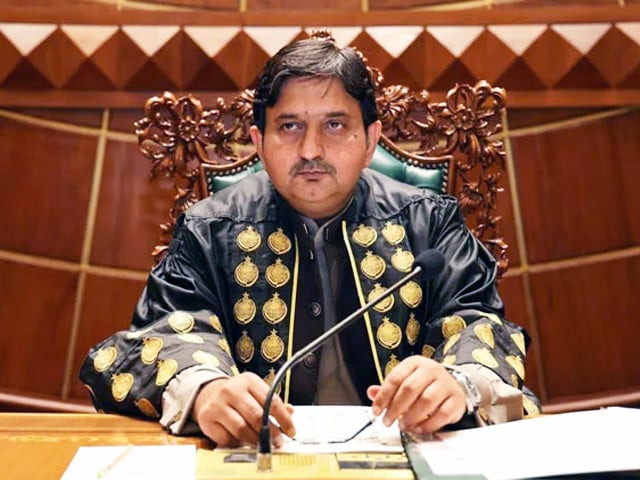Lahore:
The president of the Punjab assembly, Malik Muhammad Ahmad Khan, apparently put the question of the disqualifications of the PTI to rest on Saturday by governing the requests for disqualification against 26 legislators suspended as non-compliance, but by transmitting the male to the judiciary and the electoral court.
The sword of disputes still hangs on the legislators suspended, the speaker clearly indicating that even if its doors were not closed, the petitioners must first strike the right ones, by obtaining a declaration from a competent court before seeing his office again.
In a decision considered as a political de -escalation, the speaker rejected the requests made against 26 legislators of the suspended opposition, following a series of successful talks between the Treasury and the opposition benches.
A six -page decision signed by the speaker describes the justification for the rejection of the four separate applications, which sought to disqualify the AMP affiliated to the PTI on their disorderly and abusive conduct during the budgetary session.
The decision to reject requests has grown after the recent behind -the -scenes negotiations between the government and the opposition leaders have borne fruit.
According to sources, the reintegration of suspension AMPs is now expected soon.
It should be noted that President Khan previously suspended the 26 PTI legislators under rule 210 (3) of the procedural rules of the Punjab provincial assembly, 1997, following their disruption of the speech of chief Minister Maryam Nawaz on June 27.
In his detailed decision, President Khan noted: “Although serious legal and constitutional violations, including the constitutional oath, were alleged by the applicants, these violations must first be established in a court or a competent court court before deciding whether a question of qualification appeared under article 63 (2) of the Constitution and reference to the question of the Commission of the election of Pakistan.”
“People are at the origin of all power, and thanks to their vote, they give confidence – not to be defeated without the most serious reasons. Disqualifying a representative is not only to silence a voice – it is to favor people. Because an elected house is not only a room of laws. He added.
The speaker judged that references to previous cases, such as the articles of Panama and other disqualification case law under articles 199 and 184 (3) of the Constitution, were not valid in the current context.
Such petitions, he noted, could undermine freedom of expression in the House and cancel the presence of the opposition. Article 19 protects a solid debate – even in the event of abrasive – subject to reasonable legal restrictions.
“These restrictions are found in our rules, and not in the threats of permanent disqualification. May the well-being of the people be the supreme law, the assembly must remain a forum where dissent is expressed, not extinguished,” said the decision.
President Khan stressed that the well-being of the electorate is better preserved when the Chamber manages the internal disorder itself, without the chosen representatives of voters of their rights.
He also expressed his concern about the lack of familiarity of many members with the rules of assembly, legislative processes and the effective use of permanent committees.
He called for targeted training to maintain parliamentary supremacy and democratic responsibility.
“As elected representatives, we must legislate in a responsible manner, put an end to political victimization and work together to maintain the supremacy of the People’s Assembly and protect our democracy. The political parties are, after all, the real guards of democracy and the responsibility of maintaining the democratic functioning of the Chamber is all collectively,” added the speaker.
He called for an interpretite dialogue which recalls the Charter of Democracy to ensure that the Assembly works effectively as a space for public interest and a real debate.
Referring to political theory, Khan noted: “Modern societies are built on dialogue; as Jürgen Habermas wrote:” The public sphere is this area of our social life in which something that was approaching public opinion can be formed “
In a strong criticism of the constitutional clauses used historically to undermine democracy, President Khan said: “As a speaker and political worker, I firmly oppose the anti-democratic constitutional provisions. Elected politicians. We must end this vicious cycle;
He said that the abusive use of these articles undermines constitutional law to the political association and representation under article 17.
The disqualification of elected officials on allegations or technical details violates the presumption of innocence, favors voters and erodes the legitimacy of parliament.
“The disqualification of elected representatives has deep roots in the history of Pakistan.
He criticized the political parties to occasionally encourage such practices, citing Panama “showing the trial” as an example of an overrun which continues to affect the political landscape by non -democratic means.
“This destructive chain must be broken,” said President Khan. “The very fact that the Constitution has been exploited in this way means that such difficult questions can be and have been raised.”
He called on the Federal Parliament to withdraw these dictatorial remains from the Constitution to recover democratic values.
By concluding his remarks, President Khan said: “During my mandate as president, I will work to respect the parliamentary regime and the principles of representative constitutional democracy, as envisaged by the founding fathers of our great Islamic Republic.”




